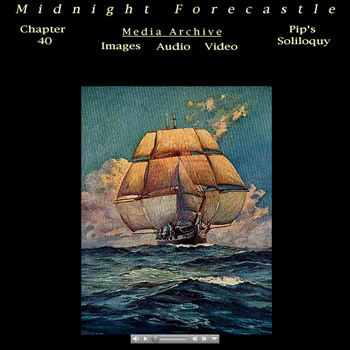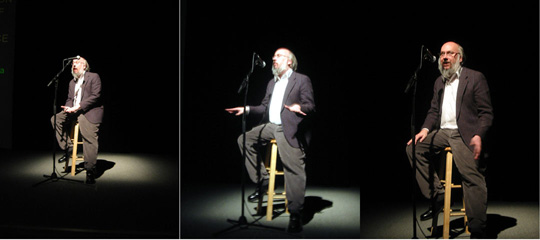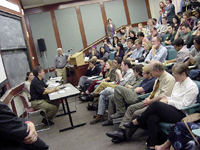Comparative Media Studies
Overview
Established as a graduate program in 1999-2000, Comparative Media Studies aims to integrate the study of contemporary media (film, television, digital systems) with a broad historical understanding of older forms of human expression. The program embraces theoretical and interpretive principles drawn from the central humanistic disciplines of literary study, history, anthropology, art history and film studies, and aims as well for a comparative synthesis that is responsive to the distinctive emerging media culture of the 21st century. Students in the program are taught to explore the complexity of our media environment by learning to think across media and to see beyond the boundaries imposed by older medium-specific approaches to the study of audio-visual and literary forms.
The comparative and cross-disciplinary nature of both the graduate and undergraduate programs is embodied in a faculty drawn from Art and Architecture, Anthropology, Foreign Languages and Literatures, History, Literature, Music and Theater Arts, Philosophy, Writing and Humanistic Studies, Science Technology and Society, Media Arts and Sciences, and Political Science. Approximately 35 faculty members teach subjects in Comparative Media Studies.
The graduate program consists of a two-year course of study leading to a Master of Science degree. The program aims to prepare students for careers in fields such as journalism, teaching and research, government or public service, museum work, information science, corporate consulting, media industry marketing and management, and educational technology. Recent graduates are now employed by media and technology consulting firms, media production companies, and other colleges and universities. Four alumnae are pursuing advanced degrees at New York University, the University of California at Los Angeles, and at MIT, where two have been accepted to the doctoral program in Science, Technology, and Society.
Research
Themes
CMS research themes cross academic disciplines and involve both traditional and emerging communications media, establishing a focus for public presentations, research agendas, and curricular initiatives. The primary research themes are Creativity and Communication in an Interactive Age; Generation.org–Childhood and Adolescence in a Hyper-mediated Culture; Informed Citizenship and the Culture of Democracy; Global Culture and Media; Media in Transition; and Transforming Humanities Education.
In 2001–2002, CMS ran three lab groups (Creativity and Communication in a Digital Age; Global Culture and Media; and Transforming Humanities Education) which met weekly and involved the graduate research assistants. CMS faculty, research staff, and visiting scholars, as well as other professionals and collaborators, led weekly discussions around both relevant theoretical scholarship in each area and how such ideas could be applied to the project-specific work being pursued by each group.
Projects
 A screenshot from the Games-to-Teach Project: Replicate. Guide your virus through a host and infect its cells. |
The iCampus Games-to-Teach Project, run in partnership with the Learning Sciences and Technologies Group of Microsoft Research, focused on the interactive, immersive, and narrative potential of digital games as an educational medium. Over the past year, CMS explored a variety of new pedagogical models using games and applied these models to a series of conceptual game prototypes designed to support advanced high school and first-year college science and engineering curricula. This coming year, CMS will develop a smaller set of working prototypes to use and assess in MIT curricula during spring 2003; the project will also extend conceptual development to include prototypes in the humanities and social sciences.
 "Melville: Midnight Forecastle" developed by Wyn Kelley, allows students to research aspects of multiculturism through an annotated chapter of Moby Dick, an archive of pertinent sound, image, and video documents, and a multimedia essay combining in-depth text commentary and archival materials. A screenshot from the MetaMedia Project. |
The MetaMedia Archive Project, funded by the D'Arbeloff Award for Excellence in Education, began development of interactive archive models for use across a broader range of topics in the humanities and social sciences; early projects included work in Shakespeare, Melville, and German and Spanish language and culture. Intended to serve as modules that teachers and students could use to explore rich subject areas, create rhetorical multi-media documents, and collaborate over the Internet, early MetaMedia Archives have stretched instructors' and students' notions of textbook, research paper, and classroom. Development will continue on additional mini-archives through the coming year, including projects on oral history, early comic strips, and dance.
As part of the Electronic Arts Creative Leaders Workshops, CMS faculty conducted seminars for producers and other creative developers at Electronic Arts. These seminars afford discussion around basic concepts for thinking about the interplay between character, plot, and emotion, drawing examples from both traditional arts (literature, theater, cinema, television, opera) and from contemporary computer and video games.
In September 2001, a volunteer group of CMS faculty and students conceived and launched a web site for teachers and students to "reflect on humanity and media after tragedy." Re:constructions was launched within a week of the terrorist attacks of 11 September and provided a place where visitors could find essays, resources, and lessons to help them better understand some of what they saw, heard, or experienced through various media and in cultural and social spaces. The URL for the site is http://web.mit.edu/cms/reconstructions/.
CMS is also pursuing a variety of additional research efforts and projects with a diverse set of collaborators, including the MIT Media Lab, MIT's Initiative on Technology and Self, American Federation of Scientists, Beijing Film Academy, Royal Shakespeare Company, Public Radio International, Stanford Medical School, and CMS Research Consortium members, including HopeLab and Initiative Media.
Fundraising
Development activities have yielded several major new and continuing sponsored research projects, as well as new members to the MIT Research Consortium in Comparative Media Studies. A continued goal of activities this past year was to develop and implement sustainable and scalable business, teaching, and research models within which faculty and graduate students could explore interdisciplinary research themes and educational priorities. As it continues to solidify administrative and academic infrastructures, CMS has begun to focus on cultivating a broader range of sponsored research and gifts from corporations, individuals, and foundations.
Gerald Katell, an MIT alumnus and CMS Advisory Group member, pledged $1 million to endow the Gerald L. Katell (1962) Endowed Fellowship and Education Fund in Comparative Media Studies; over time, the fund will provide valuable fellowship support for graduate students, as well as discretionary funds for educational programs.
Governance
Professor Henry Jenkins is the director of Comparative Media Studies. Professor William Uricchio is associate director. The program is under the auspices of three Humanities sections—Literature, Writing and Humanistic Studies, and Foreign Languages and Literatures. Administratively, CMS is housed in the Literature Section.
 Henry Jenkins Unplugged—Jenkins introduced and screened a series of STAR WARS fan films at the Walker Art Center in Minneapolis in October 2001. |
The program is governed by a steering committee, chaired by Professor Jenkins. Steering committee members for 2001-2002 were Professor Uricchio; Professor Peter S. Donaldson, head of Literature; Professor James Paradis, head of Writing and Humanistic Studies; Professor of Literature David Thorburn; Senior Lecturer in Writing and Humanistic Studies Edward Barrett; and Senior Lecturer in Music and Theater Arts Martin Marks.
During 2001–2002, Comparative Media Studies had three active committees, besides the steering committee: the curriculum committee, chaired by Senior Lecturer Marks; the admissions committee, chaired by Professor Diana Henderson; and the orientation committee, chaired by Associate Professor Christina Klein.
Admissions
For the second year, CMS has been operating at its target population of 20 students in residence. Our current cohort includes 14 women, and 10 international students from countries including Bulgaria, Singapore, the Czech Republic, India, the People's Republic of China, Norway, and the United Kingdom. For fall 2002 we admitted 10 students from 100 applicants; all accepted, but one later declined admission for personal reasons.
The program hosted a series of on-campus Information Sessions, designed to allow potential students to meet CMS faculty and students and evaluate opportunities through the program, and to sit in on classes and research meetings. CMS also conducted online chat sessions to facilitate interaction with potential applicants who could not attend these on-campus sessions; on-line sessions were particularly popular with a growing number of international applicants.
Undergraduate Education
The undergraduate program—established in 1982 under its former name, Film & Media Studies—serves as preparation for advanced study in a range of scholarly and professional disciplines and also for careers in media or industry. The curriculum consists of more than 50 subjects arranged in three tiers and broadly subdivided into three areas or fields: comparative media, film, and digital studies. Concentrators, minors, joint-majors and majors may specialize in one of these areas or map a coherent combination of subjects across these borders.
CMS is in the process of applying for full undergraduate major status. So far, the proposal has been approved by the Committee on the Undergraduate Program and is under consideration by the Committee on Curricula. If approved, CMS will become the first interdisciplinary undergraduate major at the Institute.
CMS has also developed educational and research programs to provide additional opportunities for undergraduates to gain both academic and professional experience in media-related fields. In January, CMS annually coordinates a weeklong IAP event, "Adapting Linear Storytelling in an Interactive Age," with Sony Pictures Imageworks.
In 2001–2002, Comparative Media Studies hired 25 UROPs for pay and credit. This record number of UROPs reflects the great increase in research activity in the program. Over the summer, we have four UROPs working on the Games-to-Teach Project, including one from the United Kingdom sponsored by the Cambridge-MIT Initiative.
Current undergraduate student enrollments for the academic years 2001-2004 stand at 13 majors, 17 minors, and 49 concentrators. The undergraduate homepage is http://web.mit.edu/21fms/www/.
Events and Programs
Conferences
In May 2002, CMS hosted its second Media in Transition conference around the theme of media, globalization, and convergence. More than 130 papers were presented by international scholars on such diverse topics as "The Cultural Politics of Pokemon Capitalism," "Indian Television and Diasopric Identity," "Internet, Identity Politics, and the Making of Counter Media Culture in Taiwan," and "Hollywood as an Instrument of European Integration." The conference focused on North American, European, and Asian experiences, and provided a platform for a historically and culturally comparative analysis of our media past, present, and future. The conference was held in conjunction with the tele-journeys exhibit at the List Visual Arts Center, and featured a special performance by MIT students, BollySpace: An Interactive Dance Technology Project, funded by the MIT Office of the Arts. Papers and audio recordings of the plenary sessions can be found on the conference web site at http://cms.mit.edu/mit2/.
Communications Forum
 John Romano, a writer and producer of several television shows including Third Watch, Providence and Hill Street Blues, and Julia Dahl, a writer for The West Wing and Party of Five, fields audience questions at an October MIT Communications Forum "Writing for TV: The State of the Art." Photo by Nadya Direkova. |
Directed by Professor Thorburn, the Communications Forum sponsors lectures, panel discussions, and conferences on all aspects of technology and communications, public policy, and media in transition. The Communications Forum sponsored several panel discussions that attracted a large audience from the academic community at MIT and in the Boston area. Topics included "Religion and the Internet," "World Media and Monopolies," Teen Activism on the Web," and "Transformations of the Book."
Colloquia
CMS sponsored weekly colloquia designed to give our graduate students, and the academic community at MIT, a rich and challenging intellectual experience, and opportunities to interact educationally and socially. Topics included "Re-play: Televised Sports and Cultural Change" (Bo Reimer); "Blaxploitation Cinema" (Isaac Julien); "Digital Arts in Boston: 'A Public Cyberdock' and 'A Chinatown Banquet' " (Liz Canner and Mike Blockstein); and "Utopian Entrepreneur" (Brenda Laurel).
Honors and Awards
Several faculty members affiliated with CMS received awards. Professor Irving Singer was a fellow of the European Humanities Research Centre at Oxford University, England. Professor Susan Slyomovics was elected a fellow in the American Folklore Society. Senior Lecturer Barrett received a Massachusetts Cultural Council Grant for Poetry. Professor Thorburn received a Margaret MacVicar Faculty Fellowship. Associate Professor Chappell Lawson was awarded the Hoover National Fellowship from the Hoover Institution, Stanford University. Professor Henderson received the Levitan Prize in the Humanities.
Student awards include the following: Nadya Direkova received an Amherst College Alumni Graduate Studies Fellowship, as well as a grant from the Council of the Arts for a photography project. Aswin Punathambekar, Sangita Shreshtova, and Zhan Li received funding from the MIT Council for the Arts for their multimedia performance BollySpace: An Interactive Dance Technology Project.
The Comparative Media Studies Administrative, Development and Support Staff Team received the 2001 MIT Excellence Award in the category "Building Bridges"; and Senior Editorial Assistant Robert Bain Jr. earned the Positive Energy award in the School of Humanities, Arts, and Social Sciences, as part of MIT's Rewards and Recognitions Program.
Publications
Professor Singer's book Explorations in Love and Sex was published by Rowman & Littlefield Publishers; Professor Singer also contributed the article "The Morality of Sex: Contra Kant" to The Philosophy of Sex: Contemporary Readings (ed. Alan Soble, Rowman & Littlefield). Professor Slyomovics' The Living Medina in the Maghrib: The Walled Arab City in Literature, Architecture, and History was published by Frank Cass Publishers. Senior Lecturer Barrett was co-author of The MIT Guide to Teaching Web Site Design (MIT Press), and wrote a book of poetry, Sheepshead Bay (Zoland Books).
Professor Edward Baron Turk's Marcel Carné et l'Age d'or du Cinema Français appeared in its first French edition, from L'Harmattan, translated by renowned film theorist Noel Burch. Professor Jing Wang edited a special issue of the journal positions: east asia cultures critique which focused on Chinese popular culture and the state. Professor Lawson's book Building the Fourth Estate: Democratization and the Rise of a Free Press in Mexico was published by University of California Press.
Professor Jenkins continued to write a monthly column on media and cultural change for Technology Review magazine and published three new essays in academic books: "Tales of Manhattan: Mapping the Urban Imagination through Hollywood Film," in Imaging the City: Continuing Struggles and New Directions, edited by Lawrence Vale and Sam Bass Warner (CUPR Press); "The Art of Contested Spaces" (with Kurt Squire), in Game On, edited by Lucian King (Barbican); and "I'm Gonna Get Medieval on Your Ass!: A Dialogue about Violence and Culture" (with Associate Professor James Cain, in The Culture of Violence, edited by Helaine Posner (University of Massachusetts Art Museum).
Administrative Note
Robert Bain Jr. is leaving his position as senior editorial assistant for a terrific reason: he will be starting as a graduate student in CMS this fall! The job has been expanded into a full-time administrative assistant position; Susan Stapleton was hired for this job.
For more information on the undergraduate and graduate programs in Comparative Media Studies, contact the CMS Office, 14N-207, MIT, Cambridge MA 02139; telephone 617-253-3599; fax 617-258-5133; e-mail cms@mit.edu.
The Comparative Media Studies web site is http://web.mit.edu/cms/.